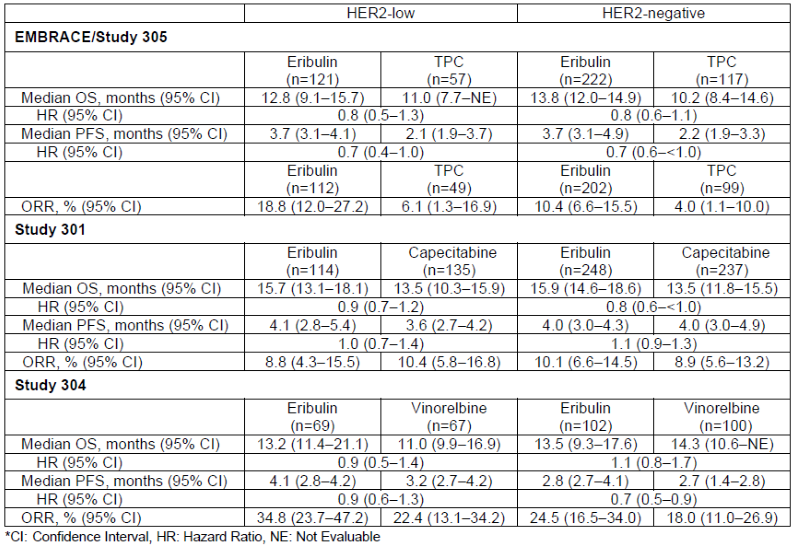Eisai Presents Results of Post Hoc Analysis of Eribulin Mesylate (HALAVEN®) at the European Society for Medical Oncology (ESMO) Congress 2022
Analysis Evaluates Efficacy of Eribulin in Metastatic HER2-low Breast Cancer Across Three Clinical Studies
Eisai Co., Ltd. (Headquarters: Tokyo, CEO: Haruo Naito, “Eisai”) announced today results from a post hoc analysis of three randomized, pivotal, Phase 3 studies (EMBRACE trial/Study 305, Study 301 and Study304) evaluating the efficacy of eribulin mesylate (marketed as HALAVEN®) versus other chemotherapies (Treatment of Physician’s Choice [TPC], capecitabine, and vinorelbine, respectively) in patients living with metastatic breast cancer (mBC) whose tumors have low or no HER2 expression. These data were presented as a poster (Presentation: #259P) at the European Society for Medical Oncology (ESMO) Annual Meeting (#ESMO22), held virtually and in-person in Paris, France from September 9-13, 2022.
The HER2-low breast cancer subtype is a newly defined subset consisting of tumors that would have previously been considered HER2-negative based on an immunohistochemistry (IHC) assay and an in situ hybridization (ISH) assay. HER2-low tumors express low amounts of the HER2 protein, but not enough to be considered HER2-positive. HER2-low is defined as an IHC of 1+ or 2 with a negative ISH. Of the approximate 288,000 new cases of female breast cancer expected to be diagnosed in the U.S. in 2022,1 it is estimated that approximately 80-85% of patients would previously have been considered to have the HER2-negative subtype. Of those patients, about 60% would now be considered to have the HER2-low subtype.2
“In this post-hoc analysis, the outcomes seen in mBC patients whose tumors are considered HER2-low are consistent with the results of the three pivotal Phase 3 clinical trials,” said Dr. Takashi Owa, Chief Scientific Officer, Senior Vice President, Eisai Co., Ltd. “As the oncology community’s understanding of mBC continues to evolve, it’s important that we continue to evaluate the role of existing therapies in new contexts to contribute to the body of knowledge that is available to health care professionals.”
Data from the Post Hoc Analysis
The post hoc analysis included data from three trials — eribulin vs. TPC (NCT00388726, EMBRACE trial/Study 305), eribulin vs. capecitabine (NCT00337103, Study 301), and eribulin vs. vinorelbine (NCT02225470, Study 304) in patients with locally recurrent or mBC who had prior lines of chemotherapy treatments (≤2 for Study 301; 2-5 for Study 304 and EMBRACE Trial/Study 305) including an anthracycline and a taxane. A total of 1,589 eligible patients were enrolled in the EMBRACE trial/Study 305, Study 301 and Study 304, and baseline characteristics were generally balanced between treatment arms in all studies.
Median overall survival (OS), median progression free survival (PFS) and objective response rate (ORR) were analyzed. PFS and ORR were measured per Response Evaluation Criteria in Solid Tumors Version (RECIST) (v1.0 for EMBRACE trial/Study 305 and Study 301; v1.1 for Study 304) by independent imaging review. ORR was measured in evaluable patients (EMBRACE trial/Study 305) and in the intent-to-treat population (Study 301 and Study 304).
In the post hoc analysis, OS, PFS, and ORR among patients with HER2-low or HER2-negative status were generally similar to those of the eribulin treatment arms overall in each of the EMBRACE trial/Study 305, Study 301 and Study 304.3,4,5 Efficacy results for patients with HER2-low and HER2-negative status across all three studies are summarized in the table below:
Media Inquiries:
Public Relations Department,
Eisai Co., Ltd.
+81-(0)3-3817-5120

